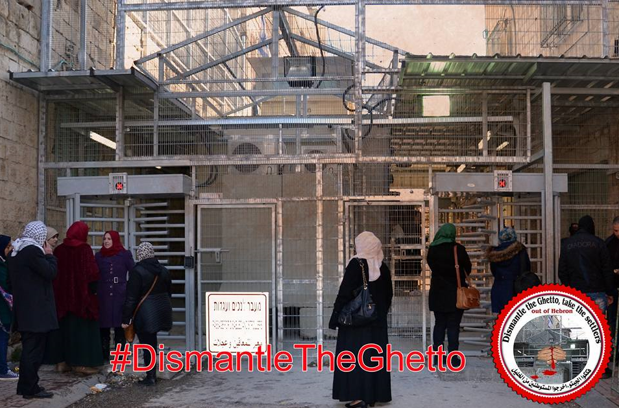I would have preferred to have been killed

1. TESTIMONIES FROM THE GROUND
This section of the report includes the testimonies of people living in the H2 area. As stated in an article published in Voice Over, Palestinians are too often reduced to mere victims in the public — “miserable, head bowed, wailing, weak, and begging for mercy”.7 In the same article, the writer Mohammad El Kurd, echoing Said’s writings, calls for reclaiming the narrative and, more importantly, reclaiming their anger. “We are human not just because we cry when we lose our mothers or homes. We are human because we feel rage and disdain, because we resist.”8
Human Rights Defenders provides people living in this sensitive area with a space to share their stories. The following accounts provide a glimpse of the unbearable situation that the families are going through.
In the following accounts names have been replaced with initials to protect the identity of contributors.
Testimony 1: Targeting activists
A woman working with B’Tselem who used to document the Israelis attacks, asked her son to take out the garbage which had been in the house for two days due to the curfew. One of the soldiers saw him so the child ran back to the house. The army stormed the house, intimidating the woman and asking her where her son was. When they found the 16-year-old boy, they blindfolded and handcuffed him and threatened him with arrest. The family was forced to leave the house for one week. It is evident that the soldiers knew that this woman was an activist, making her and her family a deliberate target. A. reports that when he visited the family, her
7 A void of words: the legitimacy of Palestinian voices comes through anger (voiceoverfoundation.org) 8 Ibid.
child was not able to eat for days because he was traumatized and in constant fear that he would be shot by the soldiers.
Testimonies 2 & 3: Restricting access to medical care
In the As-Salaymeh neighborhood soldiers prevented a 14-year-old girl from crossing a checkpoint when she was trying to go to the medical clinic. Her father reached her and finally they let her cross with her cousin. On the way back the soldiers stopped them from going home and forced them to wait for two hours.
A similar incident occurred with a 50-year-old woman who was on her way to the clinic. One of the soldiers blindfolded her, while her husband attempted to reason with them. Her ‘offense’ was being outside during the curfew, despite the humanitarian urgency of her trip, which was disregarded by the soldiers.
Testimony 4: Obstruction of Palestinian Ambulances
In this same area, a harrowing story happened at the beginning of the genocide. A. was visiting her father. She was pregnant and likely feeling scared, the stress reflecting on her baby’s health. Soon, she began experiencing intense pain and urgently needed to go to the hospital. The soldiers prevented her from getting out. The father was yelling at the soldiers begging them to let her go to the hospital. She decided to come back home and try to calm down, but after 30 minutes she was still feeling sick. They started to communicate with other families telling them that she was bleeding, so finally someone called the ambulance. The ambulance was also obstructed by the checkpoints. After two hours she lost her child. The ambulance was not able to save her baby.
Testimonies 5 & 6: Sexual Harassment at Checkpoints
- K. is a young woman who lives nearby the Ibrahimi Mosque, shared her story:
“I live in a closed area, and because I work, I have to leave the house every day. A situation happened to me a while ago (the period is not specified). I was going home from work, and I was stopped at the military checkpoint called ‘Abu Al-Rish,’ where one of the soldiers (male) searched me. I refused that and asked to be searched by a female conscript, but the Israeli soldier refused that, and claimed that I had hidden something inside the robe, even though I was wearing a wide
robe. Apparently, he indicated that there was something inside the robe, and because he was a conscript, I refused to let him search me, so I asked to bring a female soldier to inspect me, but he refused.”
“Of course, he tried more than once to put his hand on my body under the pretext of searching me, but I refused. I asked for help from anyone passing the checkpoint, and some people who live in the same area came and took me out of the military checkpoint.”
“After that, I went to the Israeli police to file a complaint against him, but the soldier claimed that I insulted him, even though I did not insult him or anything like that.”
After that, whenever she encounters a soldier at the military checkpoint, he always prevents her from crossing, or he stops her, provokes, asks for her ID, harasses her, and stops her from an hour to half an hour.
“The entry and exit process is subject to the mood of the soldier, as sometimes I pass through the checkpoint and sometimes I am stopped for one to two hours even though they work and live in the same area. Sometimes the checkpoint gate is closed without reason for several hours and we are prevented from entering through the military checkpoint.”
“On holidays such as Eid al-Fitr, relatives were prohibited from visiting us, and even there were household items that were di cult to bring into the house, such as a knife to use in the kitchen, as I had to borrow a neighbor’s knife or bring it by passing through the neighbors’ rooftops, moving from rooftop to rooftop to bypass the military checkpoint, and I do this when the checkpoint is closed or if the same soldier who tried to search me was there.”
On the 12 of May we went to visit some of the families living in the Jaber neighborhood.
While we were sitting all together drinking chai, the mother of the family told us that her third son was sexually abused by one of the soldiers at the checkpoint. He was so afraid when he returned home that he was not even able to tell her what happened.
Their cousins, while they were coming across the neighborhood during the curfew, were stopped by the IOF and brought to the checkpoint. Blindfolded and handcuffed they were forced to stay for 6 hours kneeling on the ground, exposed to freezing temperatures. While being held like this, the soldiers spat at them, intimidated them with the dogs, laughed at them, and threw food at them. One of the boys recalls “I would have preferred to have been killed”.

